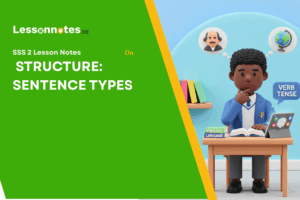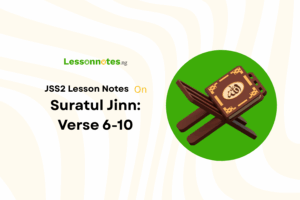Clauses: Noun, Adjectival & Adverbial Clauses SS3 English Studies Lesson Note
Download Lesson NoteTopic: Clauses: Noun, Adjectival & Adverbial Clauses
GRAMMATICAL STRUCTURE
A clause is a group of words with a finite verb. A clause should have a subject and a predicate.
e.g. Idowu bought a piece of land.
Subject: Idowu
Predicate – bought a piece of land
Types of Clause
There are two types of clauses.
Independent clauses: These are also called principal clauses. An independent clause expresses a complete thought and can stand on its own as a sentence. e.g. My English master is a kind man.
Dependent Clause: These are also called subordinate clauses. A dependent clause does not express a complete thought and cannot stand on its own as a sentence. It depends on an independent clause for its meaning E.g. which he recommended.
There are three types of subordinate clauses.
Noun Clauses
A noun clause is a subordinate clause that has a noun as the head word. A noun clause performs the functions of a noun. A noun clause is usually introduced by ‘what’ and ‘that’, but ‘that’ is sometimes omitted before the noun clause. A noun clause answers the question ‘what or who?’
Examples of noun clauses
- That he was insulted painted him a great deal.
- The important thing is that he has arrived.
- Honesty is what we want.
Functions of Noun Clause
- A noun clause performs the functions of a noun
Subject of a sentence
- What he said is bitter.
- That he was insulted pained him a great deal.
Object of a sentence
- The cook for us what we should eat
- He told us that he would come.
Complement of subject
- Honestly is what we want.
- The important thing is that he has arrived
Complement of object
- We call him what he likes.
- Complement of a preposition
- The prize will go to whoever wins.
Adjectival Clauses
An adjectival clause is a subordinate clause that performs the functions of an adjective. The following conjunctions are usually used to introduce adjectival clauses; who, whom, whose, that, which, etc.
Examples of adjectival clauses
- The man who came here is a teacher, (‘who came here’ modifies the noun ‘man’)
- That is the goat that ate our yam. (‘that ate our yam’ modifies the noun goat’)
- It was he who slapped me. (‘who slapped me’ modifies the pronoun he’)
- The lady whose car was stolen is crying. (‘whose car was stolen’ modifies the noun ‘lady)
- She has visited the place where he was born. (‘where he was born’ modifies the noun ‘place’)
- Here is the man about whom I was talking to you. (‘about I was talking to you’ modifies the noun ‘man’)
Adverbial clause
An adverbial clause is a subordinate clause that performs the functions of an adverb. Such as telling us how, when, where, why, to what extent, or under what conditions, the action of the verb is performed. In other words, the adverbial clause modifies the verb in the main clause.
Examples of adverbial clauses
- She sings as if she were happy. (Manner; ‘as if she were happy’ modifies the verb ‘sings’)
- Ada saw him when she came to his office (Time; ‘when she came to his office’ modifies the verb ‘saw’)
- She can be found where the man lives. (Place; ‘where the ‘man lives’ modifies the verb ‘can be found’)
- The man worked so hard that he soon felt sick. (Result: ‘that he soon fell sick’ modifies the verb ‘worked’, together with its modifier ‘so hard’)
- We shall go out if it does not rain. (Condition: ‘if it does not rain’ modifies the verb ‘shall go’, together with its modifier ‘out’)
Types of Adverbial Clauses
The different types of adverbial clause correspond with the nature of information which the clause gives about the verb in the main clause.
Of time
- Emeka did not bring gifts when he visited you last. Before you start writing, study the question carefully.
Of Place
- He left the letter where it could be easily seen. Send us wherever you want to
Of manner
- The Lady is treating us as if we were her servants. The boy danced as though he had been dancing all his life.
Of reason
- Because he was wrong, he apologised.
- He had to fight back since he had no other option.
Of purpose
- The athlete trained very hard so that he might win the race.
- In order to secure a seat, he arrived early at the stadium.
Of result
- Sule ate so much food at the party that he started vomiting.
- The official worked so hard that he had a breakdown.
Of comparison
- Amadi drank more wine than I did.
- My brother works as hard as I do.
Of condition
- We shall attend his party if he invites us.
- Unless he invites us. We shall not attend the party.
Of concession
- Although Okorie is poor, he is well respected.
- He is intelligent even if he is naïve
Evaluation: Exercise 1, Question a –e page 225, Countdown to English.
LISTENING FOR COMPREHENSION
PARAPHRASING A POEM
Poetry is not as difficult as it seems, but most people think it is. All you need to do is understand the language of poetry. You won’t be able to read doctor’s prescriptions because you don’t understand the medical terms used in writing those words. If you understand medical terms, you will be able to read any doctor’s prescription except if the doctor’s writing is very bad. The same rule applies to law and several other professions.
People think since poetry is written in the English language, they should be able to understand without stress. Some people also think poetry is difficult either to read or write, so they try to avoid it by all means.
Ad closed by Google
As I said in a previous class, poetry is a broad subject. You won’t be able to appreciate it unless you learn its requirements. The requirements for accessing poetry include a well-trained perceptive mind and a good understanding of rhetorical devices. If you can master these two requirements mentioned, you will be able to give meaning to a poem and paraphrase when you are required to.
Now to paraphrase a poem, you simply need to read, digest and understand it. Then write in simple terms what you think the poet is saying through the poem.
Practice with this today:
On this dirty patch
a tree once stood,
shedding incense of the infant corn:
its bough stretched across a heaven
brightened by the last fires of a tribe.
They sent surveyors and builders
who cut those trees,
planting in its place:
a huge senseless cathedral of doom.
VOCABULARY DEVELOPMENT
What is law and order? Law and order is a situation characterised by respect for and obedience to the rules of a society. It also refers to demands for a strict criminal justice system, especially about violent and property crime, through stricter penalties. Examples of words associated with law and order The following are some words associated with law and order: affidavit, allegation, arrest, and alimony, among others.
ASSIGNMENT: students are to state the meaning of words associated with law and order mentioned in the class activity and use them to form sentences.
REFERENCE MATERIALS
- Oxford English Language for Senior Secondary School Book 2 F. Ademola-Adeoye etal(2012).
- New Concept English for Senior Secondary Schools, Book 2, Learn Africa Plc, Lagos. Pages 74-75. Derner, Lawrence (1975)
- An Introduction to the English Language. London: Arnoid.
WRITING
Essay Writing – Articles
An article is a piece of writing on any subject of public interest, specifically for publication in a magazine or a newspaper. The topics of such articles may be narrative, descriptive, argumentative or expository. It is important to recognize the audience for which the article is written as this determines the tone and language. The audience may be large or limited. The article however should have a mass appeal or be able to appeal to a large number of people with different biological, psychological and social backgrounds at the same time.
Rudiments of Good Article Writing
- Write just the title of the article and go straight to the introductory paragraph. Make sure to give your article a catchy title
- Make the tone and language suitable for the audience specified
- Go straight to the point
- The body must be well-organised and developed strictly respecting the writing style or clarity, originality, or imaginativeness, unity, precision and coherence.
- If the article is a controversial topic, refer to previous articles supposed to have been contributed by others on it.
- Write your full name and address at the end of your article. If for a school magazine, write your full name and class.
Sample Question
Suppose you were asked to write an article suitable for publication in your school magazine on ‘Examination malpractices in public examinations and their remedies
Outline
Title: Examination Malpractices: Causes and Remedies
Paragraph 1: Explain what examination malpractice means, stating the various forms. E.g. impersonation, copying answers from textbooks, etc.
Paragraph 2: State efforts being made by the government, examining bodies, school administrators etc. to curb this evil
Paragraphs 3 and 4: Give reasons why the efforts being made by the various bodies are not yielding the desired results. State the root causes of the evil, suggesting solutions to them.
Paragraph 5: Conclude by giving your opinion on how to finally curb the evil. This should be followed by the writer’s full name at the right-hand corner of the next line. Write your class underneath your name.
EVALUATION
- Use the outline given to write a full-length essay on the topic
READING ASSIGNMENT
- Effective English, pg 57.





















